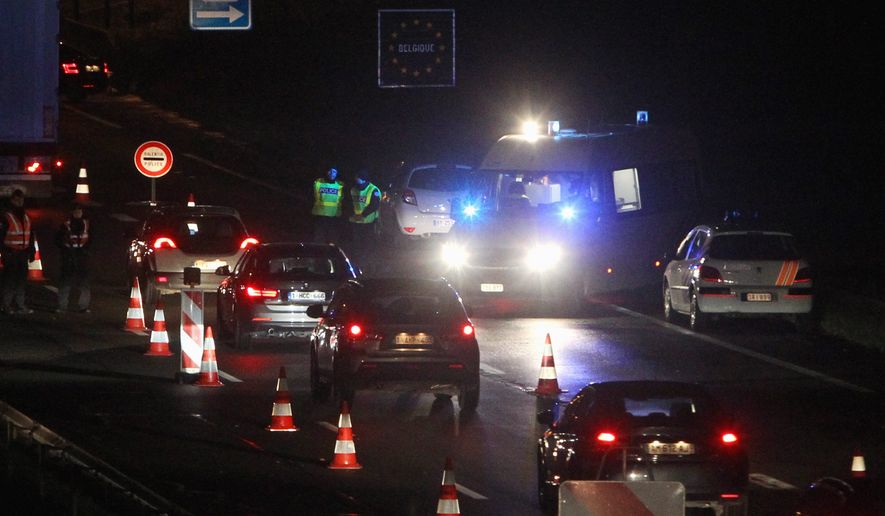France and Russia engaged in unprecedented joint strikes against Islamic State targets in Syria on Tuesday, the latest in a flurry of diplomatic and military fallout from the deadly terrorist strikes in Paris last week.
The joint operation began as Russian intelligence officials acknowledged that an Islamic State bomb brought down a Russian airliner this month over Egypt, killing all 224 aboard, and President Vladimir Putin ordered the Russian missile cruiser Moskva, currently in the Mediterranean, to start cooperating with the French in Syria.
Separately, details emerged in an international manhunt surrounding Paris, where seven of Friday’s attackers detonated suicide vests. A suspected eighth assailant has been on the run since, French authorities said Tuesday, and they are now also searching for a second fugitive thought to be directly involved in the attacks.
The French government also invoked a never-before-used European Union “mutual defense clause” to ask its partners to provide support for its operations against the terrorist group in the Middle East.
“France cannot act alone in these theaters,” French Defense Minister Jean-Yves Le Drian said during a meeting Tuesday with fellow defense ministers in Brussels shortly before the 28-nation bloc unanimously agreed to the request.
President Obama responded to the pleas by inviting French President Francois Hollande to visit Washington for talks next week, for what the White House said will be a discussion on deepening French cooperation in the U.S.-led coalition against the Islamic State and to “reiterate our shared determination to confront the scourge of terrorism.”
The Obama administration, which has struggled to keep up with events and come under criticism at home, faced fears that Russia’s stepped-up influence in the international battle against the Islamic State would complicate U.S.-led efforts to contain the extremist group.
While the strikes aimed to punish the Islamic State for the attacks on Paris and the bombing of the Russian airliner over Egypt’s Sinai Peninsula, the Franco-Russian action failed to calm European jitters, highlighted Tuesday by the sudden cancellation of a German-Dutch soccer match after authorities cited a “concrete” threat of an explosives attack at a stadium in Hannover, Germany.
Members of the German government, including Chancellor Angela Merkel, were not at the stadium but had arrived in the city to attend the game in what was supposed to be a signal that Germany wouldn’t bow to terrorism in the wake of the attacks on Paris.
There were also reports that Abdelhamid Abaaoud, the suspected mastermind of the attacks, was previously monitored and targeted by Western airstrikes in Syria. Officials have said Abaaoud, born in Belgium to Moroccan parents and in his late-20s, is believed to still be operating with the Islamic State in Syria.
U.S. military officials said they were given discreet notice before Russian forces launched a “significant number” of strikes targeting the Islamic State stronghold of Raqqa province in northeastern Syria. But the officials insisted that the former Cold War foes were not coordinating military efforts against the extremist group, also known as ISIS and ISIL.
Russian shift
The strikes on Raqqa signaled a shift by the Russians, whom the Obama administration has repeatedly accused of targeting U.S.-backed opposition rebels in Syria rather than Islamic State extremists since beginning their military campaign in late September.
Over the past year, France had been a member of the U.S.-led bombing campaign against the Islamic State. Now, the notion that Paris may coordinate more closely with Moscow could push Washington to the sidelines in any serious debate over Syria’s political future.
Mr. Putin ordered naval forces, capable of launching missiles at Raqqa, to “cooperate with a French naval group” on Tuesday, according to the Russian government-owned Sputnik International. Oleg Krivorog, who heads the Russian naval unit hosting Moscow’s fighter jets in Syria, said it is “necessary to establish direct contact with the French and work with them as allies.”
The Sputnik article appeared hours after Mr. Hollande publicly appealed to Washington and Moscow to join a grand international coalition to crush the Islamic State.
U.S. officials have been eager to support the embattled Mr. Hollande, but the administration has balked at the prospect of a Paris-Moscow alliance within the coalition. U.S. officials have long held the position that Syrian President Bashar Assad must go, something that Russia and Iran, Syria’s other main ally, have rejected.
“We’re all opposed to ISIL. That’s different from being on the same side,” Secretary of State John F. Kerry said in an interview with ABC News on Tuesday. “You cannot settle the war with Assad there because Assad is the magnet for all of these terrorists.”
Mr. Kerry argued that the Paris attacks increased “cooperation between France and the [U.S.]” and maintained that the Obama administration was “steadily ramping up” its own efforts against the Islamic State even before last week’s assault.
But key Republican and Democratic lawmakers have been sharply critical of Mr. Obama’s prosecution of the campaign against the Islamic State, saying private frustration with the White House among top Pentagon officials is at its highest level in decades. Senate Armed Services Committee Chairman John McCain, Arizona Republican, and Rep. Adam Smith of Washington, the ranking Democrat on the House Armed Services Committee, cited frustration in the ranks during interviews with The Washington Times this month.
Mr. Obama has steadfastly resisted sending ground troops into Syria or deploying a large number of special operations forces to direct the fight against the Islamic State. The president did recently approve sending 50 special operations troops to meet with and train U.S.-supplied rebels whose major objective is to isolate the city of Raqqa.
• Dave Boyer contributed to this article, which is based in part on wire service reports.
• Guy Taylor can be reached at gtaylor@washingtontimes.com.




Please read our comment policy before commenting.